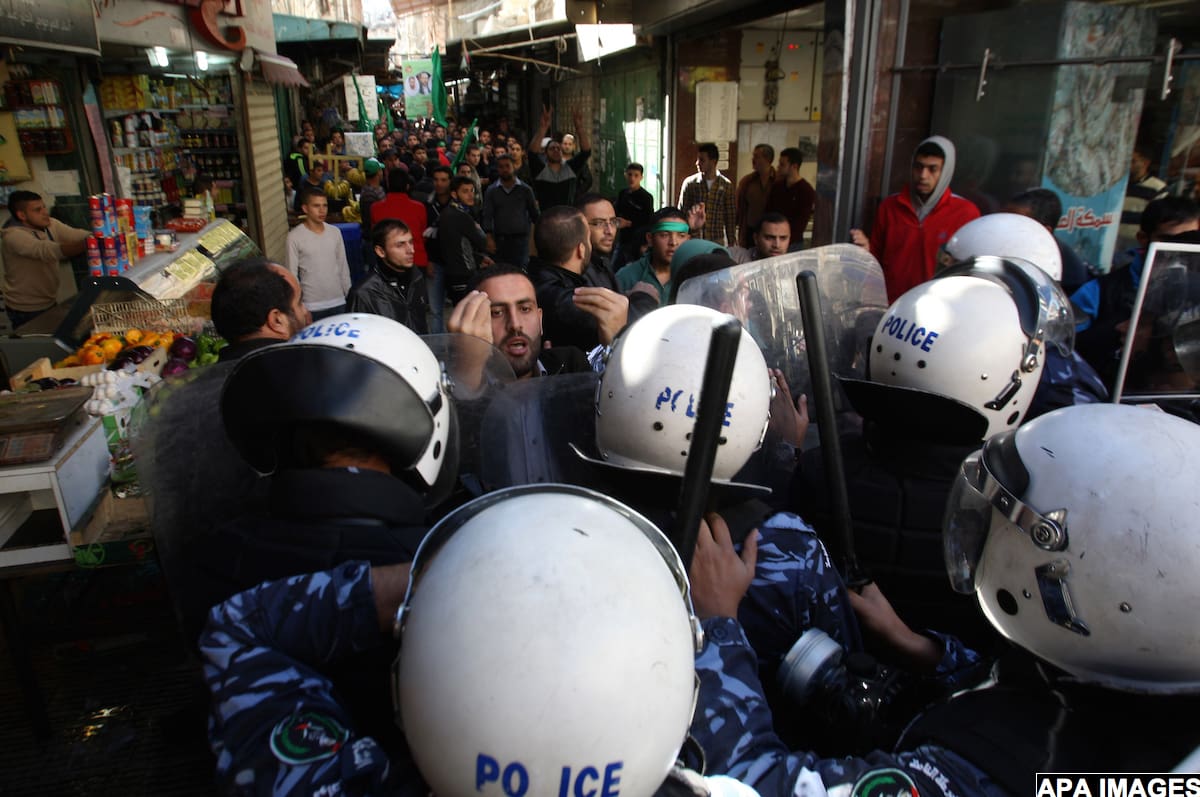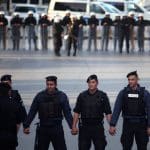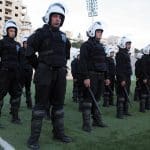
Executive Summary
From the outset, the Palestinian Authority (PA) security establishment has failed to protect Palestinians from the main source of their insecurity: The Israeli military occupation. Nor has it empowered Palestinians to resist that occupation. Instead, the PA has contributed to a situation in which the Palestinian struggle for freedom has itself been criminalized.
- This dynamic can be traced back to the 1993 Oslo Accords, but it has been galvanized over the last decade through the PA’s evolution as a donor-driven state. The enhanced effectiveness of the PA security forces as a result of massive donor investment has created additional ways of protecting the Israeli occupier, creating spaces that are “securitized” within which the occupier can move freely in the execution of its colonial project.
- Security collaboration between Israel and the PA enables Israel to fulfil its colonial ambitions while claiming to be pursuing peace. This is manifested through such actions as the PA security forces’ arrest of Palestinian suspects wanted by Israel, the suppression of Palestinian protests against Israeli soldiers and/or settlers, and intelligence sharing between the Israeli Defense Forces (IDF) and the PA security forces.
- Change will be difficult to achieve, as the system has created a segment of Palestinian society that will seek to maintain it. This segment is composed not only of security personnel in the West Bank and Gaza Strip, but also of those Palestinians benefiting from institutional arrangements and a network of collaboration and domination. However, change is not impossible.
Policy Recommendations:
The PA must take gradual but firm steps to freeze or suspend security coordination with Israel, including: Putting a stop to Palestinian security apparatus intervention in political issues, reducing security allocations in the annual budget, and disbanding parts of the security apparatus and restructuring the remainder.
Palestinian civil society must form more effective coalitions and intensify efforts to hold the PA accountable for its human rights violations. It must also address the PA discourse in which Palestinian resistance is reframed as criminal insurgency or instability, and it must scrutinize the international security bodies, such as the United States Security Coordinator, that dominate the PA security realm without accountability or transparency.
Policymakers in donor states and Palestinians who facilitate donor programs should address how “securitized aid” has transformed a liberation movement into a subcontractor to the colonizer, and has resulted in PA authoritarianism.
To speak of Israeli-Palestinian “cooperation”…is to use no less than a misnomer. This is not, however, simply because “the outcome of cooperation between an elephant and a fly is not hard to predict,” as Chomsky so pithily writes…but because under Oslo, “cooperation” is often only minimally different from the occupation and domination that went before it. “Cooperation,” in this context, is above all an internationally pleasing and acceptable signifier which obscures rather than elucidates the nature of Israeli-Palestinian relations. – Jan Selby, 2003
I…applaud the Palestinian Authority’s continued security coordination with Israel. They get along unbelievably well. I had meetings, and at these meetings I was actually very impressed and somewhat surprised at how well they get along. They work together beautifully. – Donald Trump, 2017
Overview
From the outset, the Palestinian Authority (PA) security establishment has failed to protect Palestinians from the main source of their insecurity: The Israeli military occupation. Nor has it empowered Palestinians to resist that occupation. Instead, the PA has contributed to a situation in which the Palestinian struggle for freedom has itself been criminalized. Rather than recognize resistance as a natural response to institutionalized oppression, the PA, in tandem with Israel and the international community, characterizes resistance as “insurgency” or “instability.” Such rhetoric, which favors Israeli security at the expense of Palestinians, echoes discourse surrounding the “war on terror” and criminalizes all forms of resistance.1
This dynamic can be traced back to the 1993 Oslo Accords but it has been galvanized over the last decade through the PA’s evolution as a donor-driven state that espouses neoliberal policies. The donor-driven reform of the security sector has been the lynchpin of the PA’s post-2007 state building project. The enhanced effectiveness of the PA’s security forces as a result of massive donor investment has in turn created additional ways of protecting the Israeli occupier, thus creating spaces that are “securitized” within which the occupier can move freely in the execution of its colonial project.
Such a development could only have two outcomes: “Better” collaboration with the occupying power in a way that shored up the destructive status quo; and greater violation of Palestinians’ security and national rights by their own government and national security forces.
This policy brief analyzes the evolution and “reform” of the Palestinian security forces since the establishment of the PA, and then examines Palestinian-Israeli security coordination and its deleterious effects on the Palestinian ability to resist Israel’s occupying forces as well on basic liberties. It focuses on the PA forces in the West Bank and not the situation in Gaza, which requires separate research and analysis. It concludes with policy recommendations to reinvent the PA security forces’ operations and overhaul their structures so that they may truly serve to protect their own people.
The Rise of the Palestinian Authority Security Forces
The evolution of the PA security forces can be categorized in three phases: The Oslo Accords (1993-1999), the Second Intifada (2000-2006), and the post-2007 PA state-building project.
The Oslo Accords were characterized by two parallel, yet conflicting, projects: State building and national liberation. The former implied constructing state-like institutions and a bureaucracy (soon inflated) under occupation, while the latter meant pursuing the revolutionary program for self-determination that had been adopted by the PLO. The tension between these ventures already manifested themselves under the late president Yasser Arafat’s rule. Arafat’s personalized style of governance and its resultant complex network of corruption and patronage meant that the evolution of the PA security forces was from its advent neither inclusive nor transparent. Rather, it was fraught with nepotism and was used as a tool to address the threats posed by Oslo’s opponents and to stabilize the population. In turn, it also solidified the nascent “peace” agreements. The 9,000 recruits in the “strong police force” envisaged in the 1994 Cairo Agreement became nearly 50,000 security personnel by 1999.2
This proliferation of the security forces – all spying on each other, as Edward Said once said – has had severe consequences for Palestinians.3 Arafat’s establishment of security-driven political structures nourished authoritarianism and blocked accountability mechanisms in the Palestinian political system. This resulted in a dearth of legitimacy and further insecurity for Palestinians. As the security establishment grew in numbers and institutions, Palestinians remained ill-protected, and corruption and patronage within the forces became endemic. The divide-to-rule approach paved the way for future Palestinian fragmentation.
During the Second Intifada, Israel destroyed the PA’s security infrastructure because PA security forces participated in the uprising. This created a security vacuum into which non-PA actors inserted themselves, with mixed results for Palestinians. This exacerbated intra-Palestinian competition and led external donors, the PA, and Israel to be even more concerned with building a strong and dominant security sector. In June 2002, the PA announced its 100-Day Reform Plan. In 2003 the Road Map demanded that a “rebuilt and refocused Palestinian Authority security apparatus” confront “all those engaged in terror” and dismantle “terrorist capabilities and infrastructure.” The forces were forced to combat terrorism, apprehend suspects; outlaw incitement; collect all illegal weapons; provide Israel with a list of Palestinian police recruits; and report progress to the United States.4
Accordingly, Palestinian security reform “remained…an externally-controlled process, driven by the national security interests of Israel and the United States, and characterized by very limited ownership on the part of Palestinian society.”5 The international donor community led this reform in 2005 through the establishment of the European Union Coordinating Office for Palestinian Police Support (EUPOL COPPS) and the United States Security Coordinator (USSC). This situation continues to this day, in the form of a “one gun, one law, one authority” strategy through which the PA’s monopoly on force and violence is ensured.6
The security sector consumes more of the PA’s budget than education, health, and agriculture combined Share on XThe post-2007 state-building project under the PA has aimed, mainly through EUPOL COPPS and USSC, to reinvent the PA security forces through technical means including training and weapons procurement. It has also aimed to reinvent the forces politically by constraining Hamas and its armed wing, curbing Fatah-allied militants through co-optation and amnesty, cracking down on criminals, and conducting security campaigns, particularly in Nablus and Jenin. The forces became known as Dayton’s forces in reference to Keith Dayton, the US Lieutenant General who led the PA military establishment’s “professionalization and modernization” process. Local and international human rights organizations have accused these reformed forces of human rights violations and suppressing freedoms.
The most current phase has further entrenched the predominance of Israeli security interests at the expense of the Palestinians. Disarmament and criminalization have impaired popular resistance against the occupation, including peaceful demonstrations and marches, advocacy against Israel’s violations of human rights, and student activism. Today, the PA security forces largely protect the security of the occupier and not that of the occupied. In short, the security of Palestinians has been jeopardized because their own leadership has been subcontracted to repress them. The post-2007 security reform agenda has thwarted Palestinians’ national struggle, their resistance movement and their everyday security, and has subverted the very functioning of Palestinian politics.
Security Coordination as Domination
To understand the magnitude of the security coordination enterprise, it is useful to note that the Palestinian security sector employs around half of all civil servants, accounts for nearly $1 billion of the PA budget, and receives around 30% of total international aid disbursed to the Palestinians. The security sector consumes more of the PA’s budget than the education, health, and agriculture sectors combined. The sector is currently comprised of 83,276 individuals in the West Bank and the Gaza Strip, including 312 brigadier generals, of whom 232 report to the PA and 80 to Hamas. In comparison, the entire US Army has 410 brigadier generals.7 The ratio of security personnel to the population is as high as 1 to 48 – one of the highest in the world.
Security collaboration between Israel and the PA has fulfilled the Oslo Accords’ objectives of institutionalizing security arrangements and launching a peace process that is tightly controlled by the security sector in order to enable Israel to fulfil its colonial ambitions while claiming to be pursuing peace. This process of “securitized peace” is manifested in a number of ways, including the PA security forces’ arrest of Palestinian suspects wanted by Israel (as in the recent case of Basil Al-‘Araj who was arrested and released by the PA only to be chased and eventually assassinated by the Israelis); the suppression of Palestinian protests against Israeli soldiers and/or settlers; intelligence sharing between the Israeli Defense Forces (IDF) and the PA security forces; a revolving door between Israeli and PA jails through which Palestinian activists cycle for the same offenses; and regular joint Israeli-Palestinian meetings, workshops, and trainings.
Though Palestinian President Mahmoud Abbas has threatened to suspend security coordination, he has at the same time declared it a “Palestinian national interest” and a “sacred” doctrine. The PA security forces’ activities and Abbas’s political maneuverings have naturally created a deep gap in trust between the Palestinian people and the PA.
Indeed, multiple surveys over the years have shown that the majority of Palestinians in the West Bank and Gaza Strip (between 60% and 80%) oppose security coordination with Israel. And in a March 2017 Palestinian Center for Policy and Survey poll, two-thirds of respondents demanded Abbas’s resignation, with 73% expressing the belief that Abbas is not serious in his threat to suspend security coordination with Israel. In a 2010 Maan News Agency poll, 78% of respondents said they believe that the PA security forces are engaged in surveillance, monitoring activities, and intervening in people’s privacy. Finally, according to Visualizing Palestine, 67% of West Bank Palestinians said they feel that they are living in an undemocratic system that cracks down on freedoms in large part as a result of the security realm.
Negative public perceptions about security coordination are fueled by lived experiences – from which elites are often spared – as well as by official rhetoric and the contents of the leaked Palestine Papers. For instance, US General Keith Dayton remarked in 2009 that senior IDF commanders asked him, in regard to the Palestinian security forces he was training, “How many more of these new Palestinians can you generate, and how quickly?” He also said that a senior Palestinian official addressed a graduating class of these “new Palestinian men” in Jordan, saying, “You were not sent here to learn how to fight Israel…you were rather sent here to learn how to keep law and order, respect the right of all of our citizens, and implement the rule of law so that we can live in peace and security with Israel.” And in 2013, in a speech before the European Parliament, Israeli president Shimon Peres stated: “A Palestinian security force was formed. You and the Americans trained it. And now we work together to prevent terror and crime.”
Coordination will remain a feature of the skewed reality that favors Israel if action is not taken Share on XWhile security coordination between Israel and the PA has been cemented since the Oslo Accords, the status quo is not a foregone conclusion. However, change will be difficult to achieve, as the system has created a segment of Palestinian society that will seek to maintain it. This segment is composed not only of security personnel in the West Bank and Gaza Strip, but also of those Palestinians benefiting from institutional arrangements and a network of collaboration and domination. The status quo is beneficial for them, and “stability” is their mantra. They are committed to an approach that privileges the political, economic, and security elite, and they have no incentive to reverse the rules of the game.
Any attempt to halt security coordination would thus have real consequences for the PA and its leadership. Yet the perpetuation of the status quo is destructive for the majority of Palestinians living under Israel occupation and for the Palestinian people at large. With the crushing of the ability to correct political wrongdoing and hold elites accountable, business as usual will likely continue. Security coordination will remain a defining feature of the skewed reality that favors the occupier if action is not taken – and soon.
Reinventing the PA’s Security Doctrine and Establishment
The entrenchment of the PA security establishment requires policy interventions at multiple levels, from correcting biased rhetoric to establishing accountability mechanisms. The following recommendations, addressed to different stakeholders, propose an overhaul of the PA security forces’ operations and structures.
The Palestinian Authority
The PA must listen to the Palestinian people and respect their wishes and aspirations, including in the security domain; otherwise the legitimacy and trust gap will grow far greater. There has never been an inclusive Palestinian political system, but a more responsive, representative, and responsible leadership would ensure that the security of Palestinians, rather than that of their occupier and colonizer, is a core concern. An authentic security sector, as Tariq Dana has argued, would mean an end to the “focus on internal policing known as the ‘Dayton Doctrine’” and “a program that demands accountability and justice be put in place.”
As Hani Al-Masri has elaborated, this would require gradual but firm steps to eventually freeze or suspend security coordination, including: Putting a stop to Palestinian security apparatus intervention in political issues; reducing security allocations in the annual budget; disbanding parts of the security apparatus and restructuring the remainder, with an emphasis on professionalism, patriotism, and freedom from political nepotism; and instructing the security apparatus to resist raids by Israel in Area A.
Although the PA still argues that the current security arrangements and division of labor serve the two-state solution, the relentless Israeli colonization of Palestinian land means that the PA and its leadership must reassess their function. The looming threat of annexation should push the PA to take action before its role solidifies as a subcontractor to the Israeli occupation.
Palestinian Civil Society
Palestinian civil society organizations, especially human rights organizations, must form more effective coalitions and intensify their efforts to hold the PA and its political and security leadership accountable for their human rights violations. In the absence of institutions that perform checks and balances, pressure that goes beyond writing and publishing reports (though this in itself is an important act) is urgently needed. In other words, Palestinian civil society organizations need to develop practical actions that confront the PA’s continuous rights violations.
Resistance is the duty of the Palestinian people, especially when policymakers do not represent them Share on XThese civil society actors, including academic institutions, public intellectuals, and think tanks, must also address the PA’s faulty discourse, in which Palestinian resistance is reframed as criminal insurgency or instability. Israeli and international actors who use this discourse should also be confronted. Civil society must embrace and operationalize resistance rather than see it criminalized, and view it as an all-encompassing way of living under occupation and in exile. Resistance as a way of life can help to reverse how the political and security elite currently portray it. Resistance can then ensure the restoration of the core values and ideas that enable Palestinians to engage collectively to realize rights.
External actors, particularly the security bodies EUPOL COPPS and USSC, need serious scrutiny from civil society, both within Palestine and in their home countries. They cannot continue to dominate the security realm without accountability or transparency. By promoting the rule of law in an authoritarian context, these bodies contribute to the “professionalization” of authoritarian practices by (ab)using a good governance framework. Their claim that their mandate is “technical” enables them to evade the very political results of their operations and interventions. After a decade of operation, it is time to conduct an independent Palestinian-led evaluation of these bodies and use that as an accountability mechanism to reform these erstwhile “reformers” and decide on the way forward.
Donors and the Donor Industry
In a context highly dependent on aid, the supremacy assigned to securitization and militarization extends to the realm of development.8 Policymakers in donor states and Palestinians who facilitate donor programs should address how “securitized aid” has transformed a liberation movement into a subcontractor to the colonizer, and has resulted in authoritarian tendencies that favor the security establishment at the expense of other sectors, such as health, education, and agriculture, as well as at the expense of democracy.
Moreover, in Palestine, securitized aid and development have not only failed to address poverty, unemployment, and empowerment, but have also created new insecurity and illegitimacy. Development planners must acknowledge that these patterns will never be reversed unless people, and not the security establishment, drive actions and are the constant reference point.
At base, all these actions are the duty of the Palestinian people, especially when policymakers do not represent them and their aspirations. Palestinian society needs to confront the tools used to repress its mobilization and organize in order to ensure the realization of its fundamental rights. The non-factional youth-led initiative End Security Coordination that emerged in the aftermath of Basil Al-‘Araj’s assassination in March 2017 represents an example of such mobilization. In their call for action, the youths stated,
Our people have struggled for too long for us to stand idle while repressive leaders barter our oppression and dispossession for their personal gain…We are approaching 30 years since the Oslo Accords that transformed what remained of our land into open air prisons administered by unrepresentative PA officials who have hired themselves out to be our colonizers’ first line of defense…The Oslo regime does not represent us. Now is the time for us to come together and rebuild our collective struggle for the liberation of all of Palestine.
If such organized resistance can continue and increase, pressure from the people may be able to change the trajectory of PA-Israeli security coordination, rendering Palestinians better equipped to work toward self-determination and the attainment of human rights.
- Al-Shabaka publishes all its content in both English and Arabic (see Arabic text here.) To read this piece in Italian or French, please click here or here. Al-Shabaka is grateful for the efforts by human rights advocates to translate its pieces, but is not responsible for any change in meaning.
- Brynjar Lia, Building Arafat’s Police: The Politics of International Police Assistance in the Palestinian Territories after the Oslo Agreement (London: Ithaca Press, 2007).
- Edward Said, Peace and it Discontents: Essays on Palestine in the Middle East Peace Process (London: Vontage, 1995).
- Hussein Agha and 24352, A Framework for a Palestinian National Security Doctrine (London: Chatham House, 2005).
- Roland Friedrich and Arnold Luethold, eds. “Introduction,” Entry Points to Palestinian Security Sector Reform, Geneva Centre for the Democratic Control of Armed Forces, 2007.
- This monopoly of violence under occupation means that the PA’s security forces are the only bodies that have the right to dominate the security realm. As a result, non-state actors, non-statutory bodies, and armed resistance groups are marginalized, dismantled, co-opted, integrated, disarmed, or punished.
- “Securing Gaza: Challenges to Reunifying the Palestinian Security and Justice Sectors,” Unpublished report by the Geneva Centre for the Democratic Control of Armed Forces, 2016. My analysis of this report in Al-Jazeera was transformed into a graphic by PalVision.
- Anne Le More, International Assistance to the Palestinians after Oslo: Political Guilt, Wasted Money (London and New York: Routledge, 2008).












